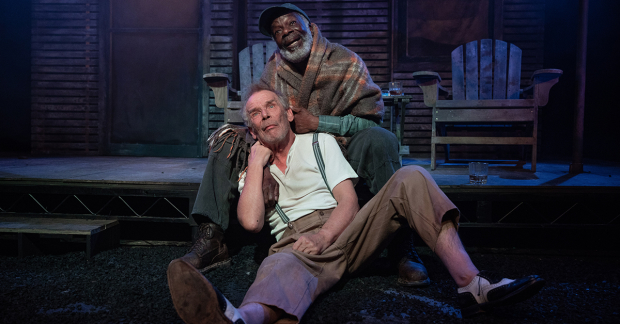
© Mark Senior
If a play hasn't been performed much, there's usually a reason. And it's quite possible to see why Sam Shepard's Ages of the Moon, first seen in Dublin in 2009, and off-Broadway (with the same cast of Stephen Rea and Sean McGinley) in 2010 has waited until now for its British premiere.
It's not that it's a bad piece, it's just that it's not much of one. Two elderly men, Ames and Byron, are sitting on a porch, drinking bourbon and chewing the fat. Ames has rung his old friend Byron in a suicidal panic in the middle of the night, overwhelmed with loneliness, and invited him to come to stay.
As they talk, over the course of a tight hour, we catch up on their friendship and their fears. The stories they tell one another about themselves are slippery. We are never sure whether what they remember is real. Was Byron really at the Kentucky Derby, sipping mint juleps that cost a thousand dollars? Was he with Ames on his honeymoon? Has Ames been thrown out by his wife, who discovered a note from a young lover, or is it all so much wish-fulfilment and dreaming?
Whatever the status of their words, passions are raised by their remembrances; as they drink, the mood shifts from the broadly comic to the more troubling and ugly. Into it all, Shepard weaves the men's sense of growing old, of life passing, of moments needing to be grasped, symbolised by the fact that at the close of this particular day there is going to be a total eclipse of the moon and it "could be one of those once-in-a-lifetime deals."
Shepard never writes boringly. There's a wonderfully elegiac ebb and flow to the dialogue, though I have to confess that I did find myself wondering whether if two women had been depicted sitting on a porch talking about post-menopausal sex and isolation in quite this way whether anyone would stage it.
However, such thoughts aside, the production does the play proud. Christopher Fairbank (Ames) and Joseph Marcell (Byron) are fine, understated, actors, and they revel in the ebb and flow of the men's conversation, revealing the under-currents beneath their actions and their chat. Alexander Lass directs with a potent sense of the power of the pause, and the timing of a drink.



















